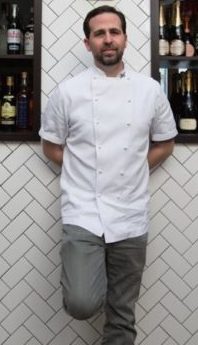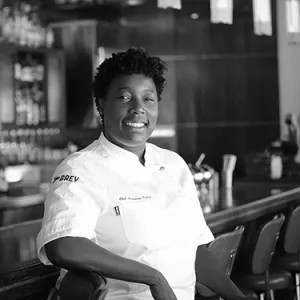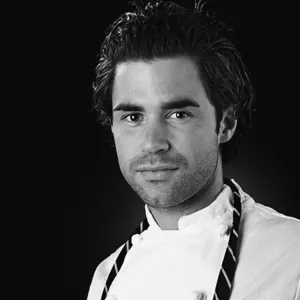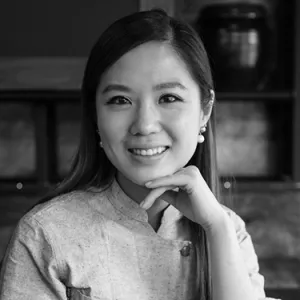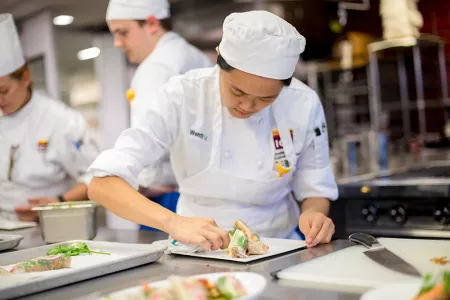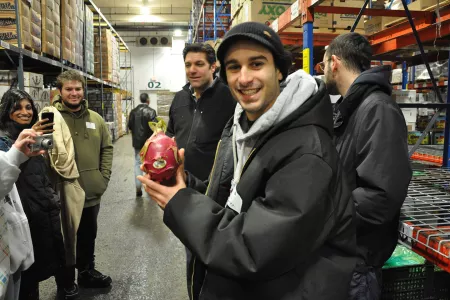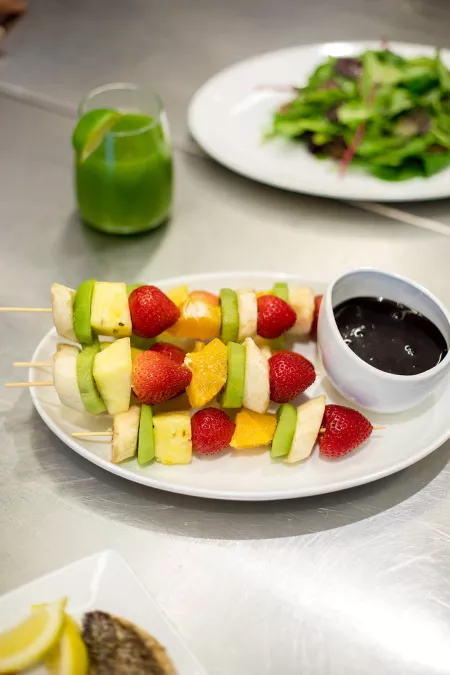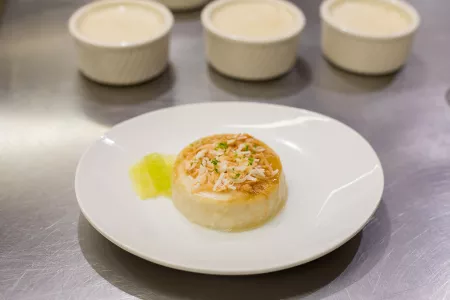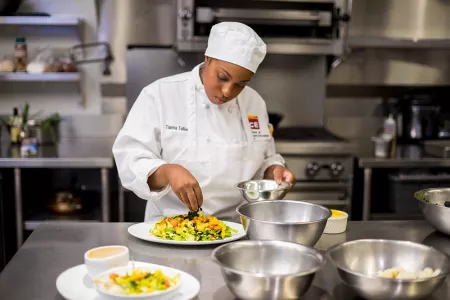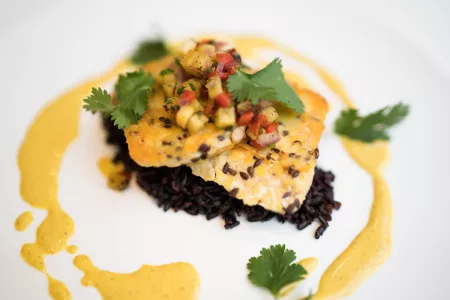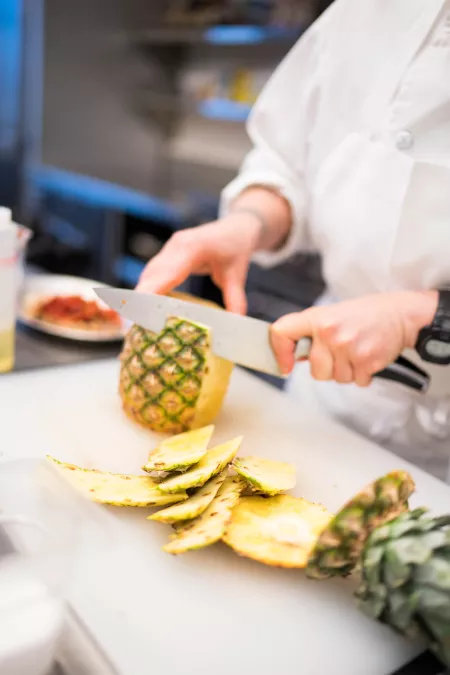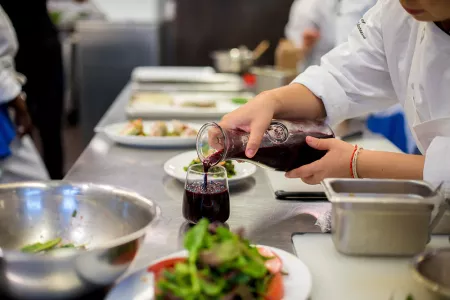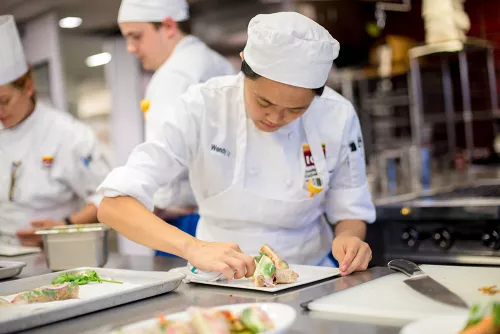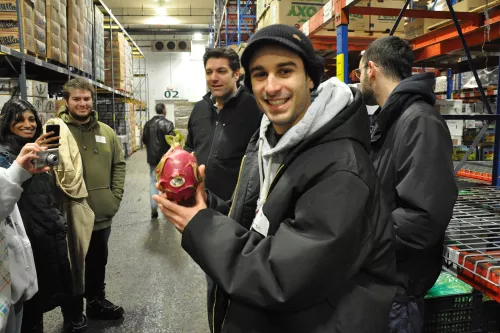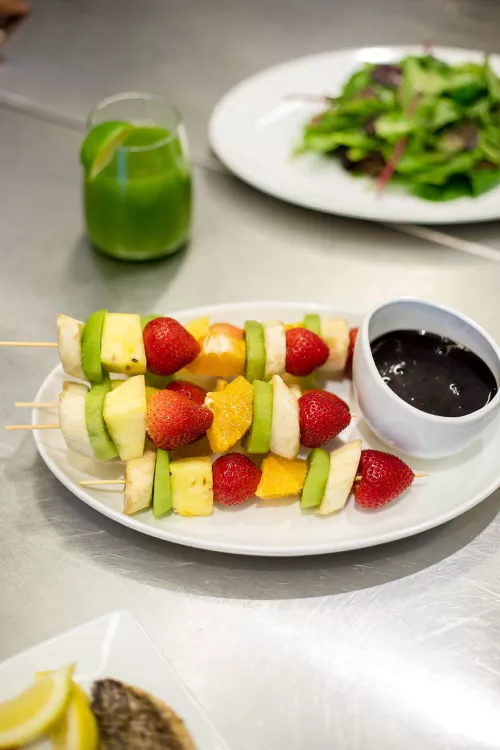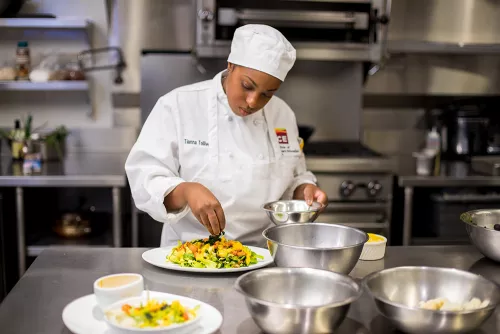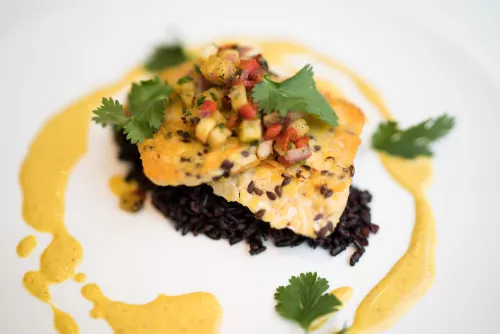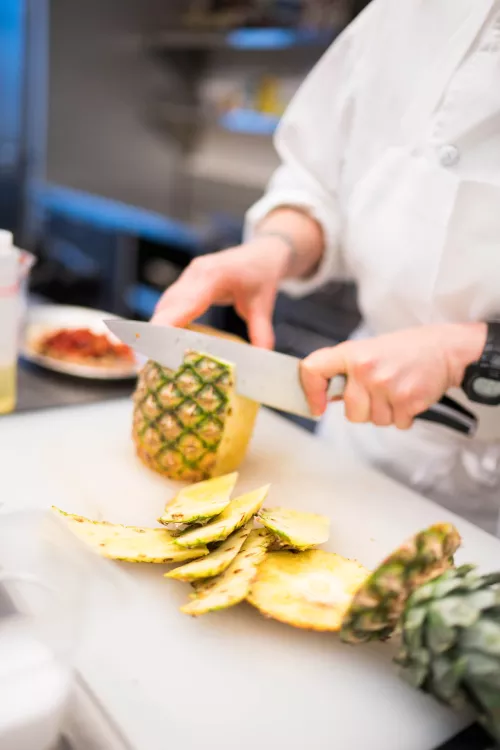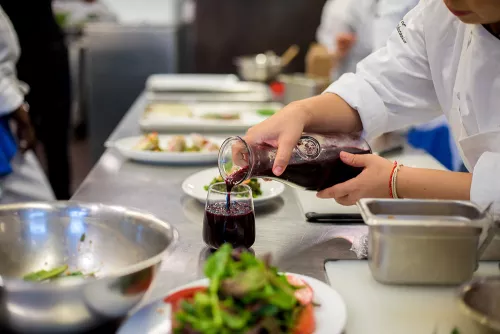Fundamentals of Plant-Based Cuisine
2.0 credits
Focusing on fundamental culinary techniques and criteria for selecting quality ingredients, this course will offer an introduction to the foundation for preparing health-supportive, whole-foods cuisine.
Course highlights:
- Knife skills training.
- Principles of food science.
- Culinary techniques including sauté, roast, blanch, braise and pressure cook.
- Exploring the health benefits, healing qualities and versatility of sea vegetables and how to prepare them.
- Dishes include: arame strudel; wakame salad; with orange and coconut-lime flan.
Soy, Grains, and Legumes
2.0 credits
In this course, we continue your education on plant-forward cuisine to include a variety of bean and grain, seitan, stock, soup and sauce preparations. We also teach how to prepare eggs in a variety of savory and sweet applications.
Course highlights:
- Identifying and preparing a variety of beans in salads, purées, stews and soups.
- Identifying and preparing whole grains using various techniques.
- Preparing vegan and vegetarian stocks using traditional culinary techniques.
- Preparing vegan and vegetarian versions of mother sauces and other modern vegan sauces.
- Preparing soups and stews.
- Preparing soufflés, custards and emulsified sauces.
- Dishes include: curried red lentil soup with coconut; beet borscht with tofu sour cream; shiitake broth with shrimp, soba and baby bok choy; and baked quinoa with fresh peas and herbs.
Concept Development & Menu Design
2.0 credits
This course is designed to acquaint students with the realities of a culinary business concept — from creativity to profitability. By surveying the industry, students explore all types of operations and analyze concepts, as well as research feasibility and location selection. Students gain the knowledge required to develop and refine their ideas. This course also gives a comprehensive view of key aspects of the menu, including planning, pricing, layout and design. Students prepare sample menus as a project, which will become part of their final business plans.
Purchasing and Cost Control
3.0 credits
Strategies for purchasing and control are vital for the success of any culinary operation. This course examines labor, beverage and food costs, and revenue control. Purchasing guidelines, inventory and control, employee performance standards, productivity and scheduling, use of point-of-sale systems, computers and new technology are also reviewed.
Social Psychology and Interpersonal Relations
3.0 credits
This course will examine social context and the way it influences our thoughts, feelings and behaviors. Students will be encouraged to reflect on the application of social psychology concepts to real-world problems and to incorporate concepts explored in class to relevance in their own lives.
Marketing
2.0 credits
Culinary businesses are marketing businesses from the moment an idea is developed through opening and operation. This course provides an in-depth examination of how a marketing plan is developed, including market research, positioning, product mix and life cycle. This includes development of potential strategies for advertising, merchandising, public relations, social media and promotion.
Service Management
2.0 credits
Managing the front of the house requires particular knowledge and skill. Students are introduced to the tools and techniques of service and service management in restaurants and other foodservice operations. This course also covers how to build customer satisfaction.
Business Communications
3.0 credits
This course introduces students to the foundations of communication in a culinary business setting. This course will examine and apply the types and purposes of various business documents; create messages using appropriate channels for delivery based on context, audience and purpose; and explore the effect of technology, such as social media on business communication. Students will also study written and verbal communication strategies as they relate to recipe writing, reviewing, food blogging and culinary demonstrations.
High-Protein Foods
2.0 credits
In this course, we prepare soups and stews highlighting whole grains, beans, vegetables and non-dairy alternatives. We teach how protein sources come in a variety of forms — both plant and animal. We also teach how to source and prepare poultry, fish and shellfish, as well as how to prepare soy foods in health-conscience, traditional forms.
Course highlights:
- Identifying and preparing traditional soy foods, such as tempeh, tofu, edamame, miso, shoyu and tamari.
- Fabricating and preparing poultry, finfish and shellfish.
- Making seitan and preparing it in a variety of ways.
- Plating theory.
- Identifying and preparing traditional soy foods, such as tempeh, tofu, edamame, miso, shoyu and tamari.
- Dishes include: stuffed poblano chilies with browned tempeh; hazelnut-crusted flounder with mango salsa; and golden turmeric panna cotta with ginger-pepper lace cookies.
Advanced Culinary Applications
2.0 credits
In this course, you will apply your growing command of health-supportive techniques to preparing salads, hors d’oeuvres, pâtés and terrines, and a buffet. In the career realm, you will hone your skills at menu planning and recipe writing while exploring career paths in personal and private cooking, catering and teaching. You will also study theoretical approaches to the energetics of food, factors that impact longevity, and the role of fats, protein and carbohydrates in a healthy, whole-foods diet.
Course highlights:
- Preparing pâtés and terrines.
- Preparing salads that showcase whole, seasonal ingredients.
- Writing and formatting a recipe properly.
- Learning how to design menus that are nutritious and balanced according to the program’s criteria.
- Preparing a balanced, health-supportive brunch and buffet menus.
- Preparing appetizers, entrees and desserts to order.
- Dishes include: massaged kale salad with roasted chickpeas and pickled red onions; truffled portobello mousse with fig-thyme preserve; and Asian buckwheat noodle salad.
Food Safety
1.0 credit
Proper food handling and safety procedures are important elements of a successful culinary business. In this course, students earn the nationally recognized ServSafe certification while learning the essential principles of food safety.
Finance and Accounting
3.0 credits
A working understanding of numbers is critically important to culinary success. The curriculum for this course focuses on the use of financial statements as a tool for control and decision-making. Topics include balance sheets, statements of net income, break-even analysis, cash flow and financing. Budgets, industry standards and variation analyses are emphasized. Actual case studies are used to provide real experience.
Supervisory Management and Food Service Law
3.0 credits
People are the most important resource in any culinary business. In this course, students focus on the major functions of management, including leadership, motivation, communication, hiring practices, recruitment, training, discipline and staff organization. In addition, this course focuses on the legal rights and responsibilities of owners and operators. Topics include labor relations, employment law, real estate and contracts. Various business structures are also surveyed.
The History and Culture of Food
2.0 credits
This course explores the importance of food and foodservice throughout history, from prehistoric times to the present. The historical influence on modern foodservice is analyzed, and culinary trends in history are identified and investigated. Topics will include the relation of food to personal and cultural identity and the interconnections between cuisine, historical events and international locations.
Baking and Desserts
2.0 credits
The quality of our baking and desserts can benefit from using ingredients that are more natural, unprocessed and whole. In this course, we convert conventional baking recipes to alternatives featuring whole-grain flours and less-refined sweeteners, without sacrificing taste or texture. You will also prepare baked goods and desserts that meet special dietary needs, such as vegan, gluten-free and dairy-free.
Course highlights:
- Preparing pies, tarts and galettes using vegan ingredients.
- Baking and decorating cakes.
- Preparing vegan cookies, puddings and ice creams.
- Preparing flourless desserts.
- Understanding how to utilize sugar, butter and white flour alternatives.
- Dishes include: chocolate cherry pecan bars; ginger cake with lemon coconut cream; and black sesame ice cream.
Bread and Pasta
2.0 credits
As you continue to explore the art and science of baking, you will focus on yeasted breads, quick breads, pizza and focaccia with wheat-free and gluten-free options. This course also includes pasta making.
Course highlights:
- Preparing quick breads, scones, pancakes, crêpes, waffles and biscuits.
- Preparing hearth and pan breads.
- Using alternative flours and ingredients in bread baking.
- Preparing ravioli, tortellini, fettucine and gnocchi.
- Preparing and serving a healthful brunch à la minute.
- Dishes include: herb ravioli with porcini mushroom pesto and tofu ricotta; wild rice pancakes; and bulgur raisin pan bread.
Food and Applied Nutrition
3.0 credits
An introductory course in the study of the principles of human nutritional needs. Students examine current dietary guidelines, the function of nutrients and dietary preferences. Students will study menus and recipes for modifications to optimize nutritional content and balance the current trends in nutritional study with culinary and baking techniques. The course highlights the relationship between diet, health, disease and how applied nutrition can benefit not only immune-challenged populations but average healthy populations as well.
Beverage and Wine
2.0 credits
Beverage sales is a challenging business. This course explores all areas of beverage service, including wine, spirits, beer, mixology, nonalcoholic drinks and bar design. Wine tasting and appreciation are included. Students will study proper alcohol service and receive safe beverage service certification.
Facilities and Design
2.0 credits
This course examines how to bring a concept to life, from design through construction and final inspection. Whether planning to renovate or build a restaurant from scratch, students gain insight into capital costs and budgeting, as well as how to work with architects, designers and contractors. Topics include equipment and systems basics, space analysis, product and people flows, and kitchen and interior design.
Food and Healing 1 and Advanced Culinary Techniques
2.0 credits
The link between diet, lifestyle and wellness is well-established, and this course will provide perspectives on this relationship by looking at cardiovascular system health, the microbiome and detoxification systems. On the culinary side, we prepare raw foods, living foods and spa and retreat specialties. You will also focus on improvisational cooking using seasonal ingredients and developing a vegan, four-course banquet project.
Course highlights:
- Improvisational cooking.
- Preparing spa and retreat cuisine.
- Preparing raw foods.
- Recipe costing and testing.
- Dishes include: pomegranate, blueberry and ginger elixir; vegetable and tempeh wraps with avocado-cilantro cream; and Mediterranean roasted black cod with muhammara.
Food and Healing 2 and Advanced World Cuisines
2.0 credits
This course extends the emphasis on integrative health as it explores food and the immune system, kitchen pharmacy, diets designed to promote cancer prevention and treatment support, Ayurveda and Macrobiotics. You will prepare specialty dishes from Asia, Mexico, India and Italy.
Course highlights:
- Preparing dishes and meals designed to boost immunity.
- Preparing Macrobiotic cuisine.
- Preparing Ayurvedic cuisine.
- Preparing world cuisine menus.
- Presenting a four-course vegan banquet.
- Dishes include: hiziki with carrots, onions and agé tofu; burdock, carrot and onion kimpura; and eggplant buns with fermented plum condiment.
Career and Self-Management
2.0 credits
This course is designed to enhance student success in transitioning to, and succeeding in, the hospitality industry by providing career planning tools, expected behaviors and soft skills essential for career success. The course emphasizes three key areas for professional success: life planning, workplace skills and career planning. Students study how to connect personal, professional and financial goals and how these goals ultimately contribute to career and personal success.
Leadership, Team Building and Change Management
3.0 credits
Great leadership goes beyond good management and permeates a culture. This course will explore leadership variables and principles, the power of vision, the importance of ethics, the empowerment of people, understanding people, multiplying effectiveness, developing others and performance management. Additionally, in this course, students will identify their own leadership styles and how best to utilize them to maximize leadership through organizational change and team building.
Externship
4.0 credits
This is the last course in the program in which students work at a foodservice-related site. While ICE strongly recommends that students extern in restaurant kitchens, they may request venues such as hotels, catering companies, corporate dining rooms or test kitchens in accordance with their professional goals.

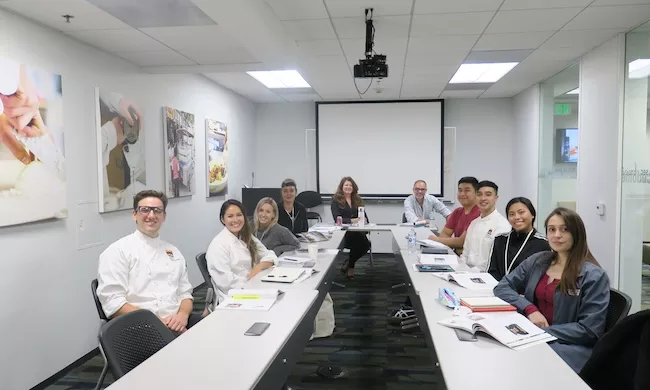

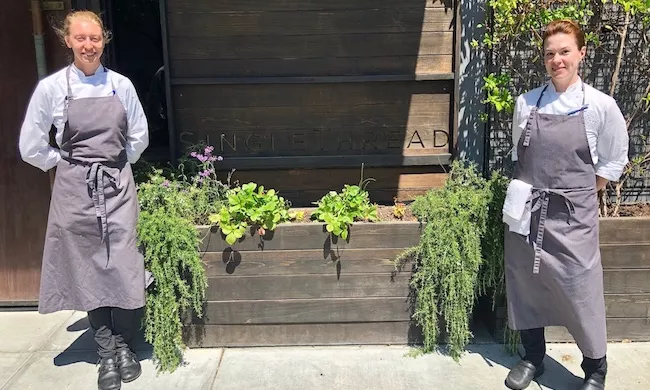
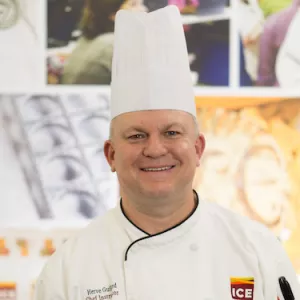
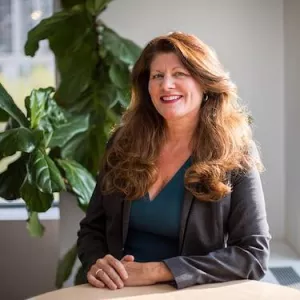
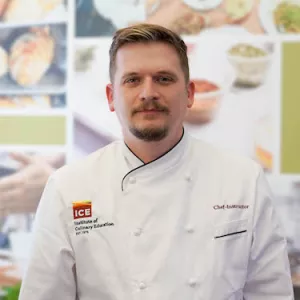
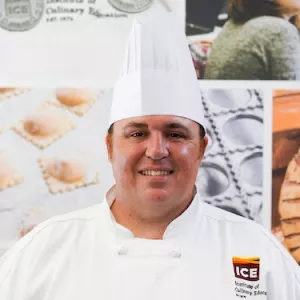

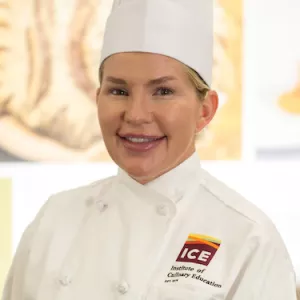

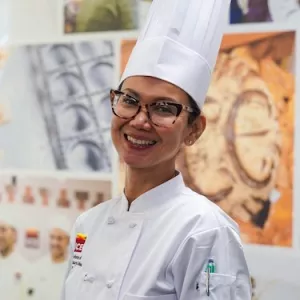
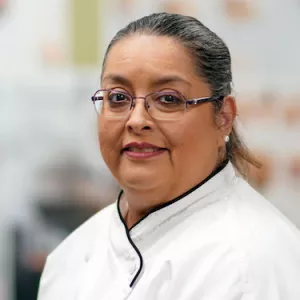
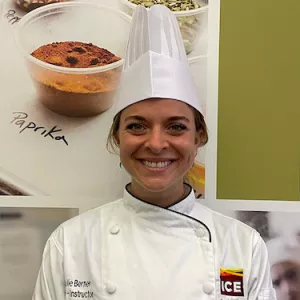
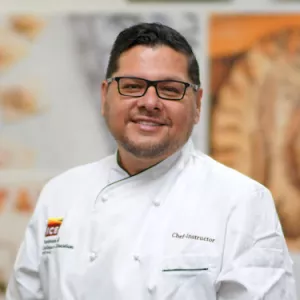
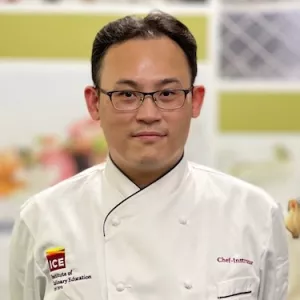
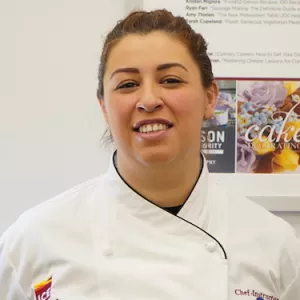
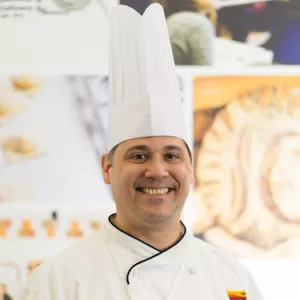

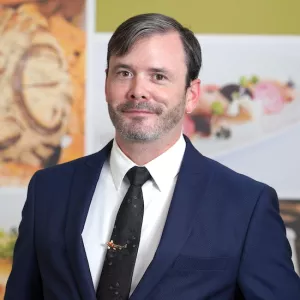
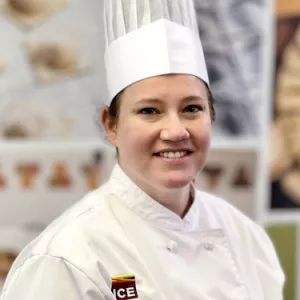
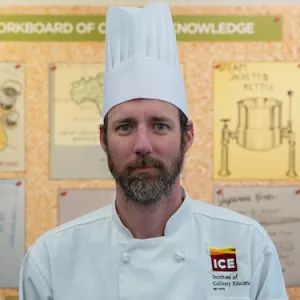
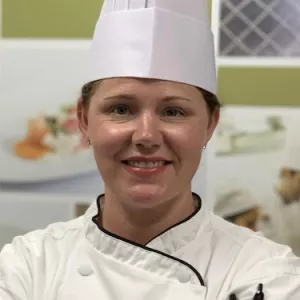
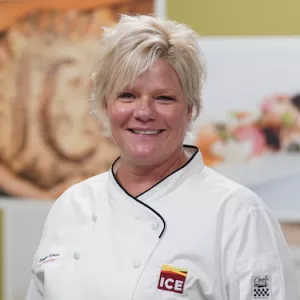
 Amanda Cohen is the chef-owner of Dirt Candy, a vegetable-focused restaurant on New York City's Lower East Side, which celebrated 10 years in 2018. The chef features seasonal vegetables as main courses, without a lifestyle or political focus, innovating with constantly changing ingredients.
Amanda Cohen is the chef-owner of Dirt Candy, a vegetable-focused restaurant on New York City's Lower East Side, which celebrated 10 years in 2018. The chef features seasonal vegetables as main courses, without a lifestyle or political focus, innovating with constantly changing ingredients.